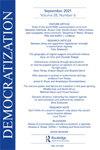操纵和合法化:政府官员解释了为什么非民主国家制定和执行宽容的公民社会法律
IF 2.9
1区 社会学
Q1 POLITICAL SCIENCE
引用次数: 0
摘要
本文章由计算机程序翻译,如有差异,请以英文原文为准。
To manipulate and legitimise: government officials explain why non-democracies enact and enforce permissive civil society laws
ABSTRACT Civil society is a bulwark against autocratic rule; its erosion contributes to democratic recession worldwide. Scholars and activists are calling attention to repressive laws non-democratic governments enact to undermine civil society organizations (CSOs). Yet, non-democratic governments do not only enact repressive laws; they also enact permissive, quasi-democratic legal rules. Evidence from case studies suggests that non-democratic governments enact such rules as part of a broader strategy to stabilize the regime. This article adds a within-case comparative study of Kenya’s four CSO regulators to the growing evidence showing that non-democracies can choose to manipulate civil society rather than repress it. The government’s words and documentation provide evidence: I triangulate elite interviews with elected officials and bureaucrats with archival data from government libraries and four CSO regulators. I find that the government enacts permissive legal rules and then uses several control and consultation tactics collectively, separately, and episodically to manipulate CSOs and legitimise the regime.
求助全文
通过发布文献求助,成功后即可免费获取论文全文。
去求助
来源期刊

Democratization
POLITICAL SCIENCE-
CiteScore
6.40
自引率
12.50%
发文量
73
期刊介绍:
Democratization aims to promote a better understanding of democratization - defined as the way democratic norms, institutions and practices evolve and are disseminated both within and across national and cultural boundaries. While the focus is on democratization viewed as a process, the journal also builds on the enduring interest in democracy itself and its analysis. The emphasis is contemporary and the approach comparative, with the publication of scholarly contributions about those areas where democratization is currently attracting considerable attention world-wide.
 求助内容:
求助内容: 应助结果提醒方式:
应助结果提醒方式:


